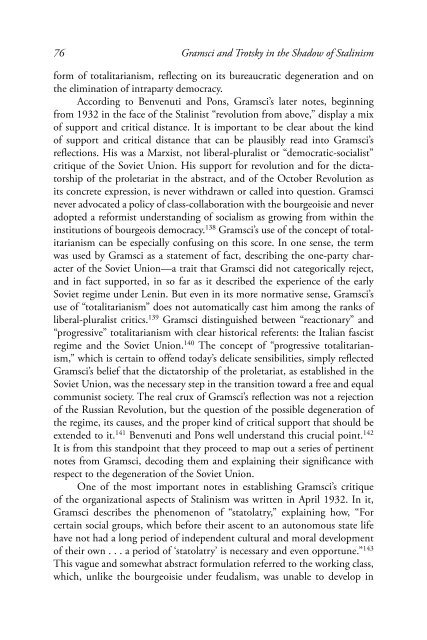Gramsci and Trotsky in the Shadow of Stalinism: The ... - Indymedia
Gramsci and Trotsky in the Shadow of Stalinism: The ... - Indymedia
Gramsci and Trotsky in the Shadow of Stalinism: The ... - Indymedia
- No tags were found...
Create successful ePaper yourself
Turn your PDF publications into a flip-book with our unique Google optimized e-Paper software.
76 <strong>Gramsci</strong> <strong>and</strong> <strong>Trotsky</strong> <strong>in</strong> <strong>the</strong> <strong>Shadow</strong> <strong>of</strong> Stal<strong>in</strong>ismform <strong>of</strong> totalitarianism, reflect<strong>in</strong>g on its bureaucratic degeneration <strong>and</strong> on<strong>the</strong> elim<strong>in</strong>ation <strong>of</strong> <strong>in</strong>traparty democracy.Accord<strong>in</strong>g to Benvenuti <strong>and</strong> Pons, <strong>Gramsci</strong>’s later notes, beg<strong>in</strong>n<strong>in</strong>gfrom 1932 <strong>in</strong> <strong>the</strong> face <strong>of</strong> <strong>the</strong> Stal<strong>in</strong>ist “revolution from above,” display a mix<strong>of</strong> support <strong>and</strong> critical distance. It is important to be clear about <strong>the</strong> k<strong>in</strong>d<strong>of</strong> support <strong>and</strong> critical distance that can be plausibly read <strong>in</strong>to <strong>Gramsci</strong>’sreflections. His was a Marxist, not liberal-pluralist or “democratic-socialist”critique <strong>of</strong> <strong>the</strong> Soviet Union. His support for revolution <strong>and</strong> for <strong>the</strong> dictatorship<strong>of</strong> <strong>the</strong> proletariat <strong>in</strong> <strong>the</strong> abstract, <strong>and</strong> <strong>of</strong> <strong>the</strong> October Revolution asits concrete expression, is never withdrawn or called <strong>in</strong>to question. <strong>Gramsci</strong>never advocated a policy <strong>of</strong> class-collaboration with <strong>the</strong> bourgeoisie <strong>and</strong> neveradopted a reformist underst<strong>and</strong><strong>in</strong>g <strong>of</strong> socialism as grow<strong>in</strong>g from with<strong>in</strong> <strong>the</strong><strong>in</strong>stitutions <strong>of</strong> bourgeois democracy. 138 <strong>Gramsci</strong>’s use <strong>of</strong> <strong>the</strong> concept <strong>of</strong> totalitarianismcan be especially confus<strong>in</strong>g on this score. In one sense, <strong>the</strong> termwas used by <strong>Gramsci</strong> as a statement <strong>of</strong> fact, describ<strong>in</strong>g <strong>the</strong> one-party character<strong>of</strong> <strong>the</strong> Soviet Union—a trait that <strong>Gramsci</strong> did not categorically reject,<strong>and</strong> <strong>in</strong> fact supported, <strong>in</strong> so far as it described <strong>the</strong> experience <strong>of</strong> <strong>the</strong> earlySoviet regime under Len<strong>in</strong>. But even <strong>in</strong> its more normative sense, <strong>Gramsci</strong>’suse <strong>of</strong> “totalitarianism” does not automatically cast him among <strong>the</strong> ranks <strong>of</strong>liberal-pluralist critics. 139 <strong>Gramsci</strong> dist<strong>in</strong>guished between “reactionary” <strong>and</strong>“progressive” totalitarianism with clear historical referents: <strong>the</strong> Italian fascistregime <strong>and</strong> <strong>the</strong> Soviet Union. 140 <strong>The</strong> concept <strong>of</strong> “progressive totalitarianism,”which is certa<strong>in</strong> to <strong>of</strong>fend today’s delicate sensibilities, simply reflected<strong>Gramsci</strong>’s belief that <strong>the</strong> dictatorship <strong>of</strong> <strong>the</strong> proletariat, as established <strong>in</strong> <strong>the</strong>Soviet Union, was <strong>the</strong> necessary step <strong>in</strong> <strong>the</strong> transition toward a free <strong>and</strong> equalcommunist society. <strong>The</strong> real crux <strong>of</strong> <strong>Gramsci</strong>’s reflection was not a rejection<strong>of</strong> <strong>the</strong> Russian Revolution, but <strong>the</strong> question <strong>of</strong> <strong>the</strong> possible degeneration <strong>of</strong><strong>the</strong> regime, its causes, <strong>and</strong> <strong>the</strong> proper k<strong>in</strong>d <strong>of</strong> critical support that should beextended to it. 141 Benvenuti <strong>and</strong> Pons well underst<strong>and</strong> this crucial po<strong>in</strong>t. 142It is from this st<strong>and</strong>po<strong>in</strong>t that <strong>the</strong>y proceed to map out a series <strong>of</strong> pert<strong>in</strong>entnotes from <strong>Gramsci</strong>, decod<strong>in</strong>g <strong>the</strong>m <strong>and</strong> expla<strong>in</strong><strong>in</strong>g <strong>the</strong>ir significance withrespect to <strong>the</strong> degeneration <strong>of</strong> <strong>the</strong> Soviet Union.One <strong>of</strong> <strong>the</strong> most important notes <strong>in</strong> establish<strong>in</strong>g <strong>Gramsci</strong>’s critique<strong>of</strong> <strong>the</strong> organizational aspects <strong>of</strong> Stal<strong>in</strong>ism was written <strong>in</strong> April 1932. In it,<strong>Gramsci</strong> describes <strong>the</strong> phenomenon <strong>of</strong> “statolatry,” expla<strong>in</strong><strong>in</strong>g how, “Forcerta<strong>in</strong> social groups, which before <strong>the</strong>ir ascent to an autonomous state lifehave not had a long period <strong>of</strong> <strong>in</strong>dependent cultural <strong>and</strong> moral development<strong>of</strong> <strong>the</strong>ir own . . . a period <strong>of</strong> ‘statolatry’ is necessary <strong>and</strong> even opportune.” 143This vague <strong>and</strong> somewhat abstract formulation referred to <strong>the</strong> work<strong>in</strong>g class,which, unlike <strong>the</strong> bourgeoisie under feudalism, was unable to develop <strong>in</strong>
















